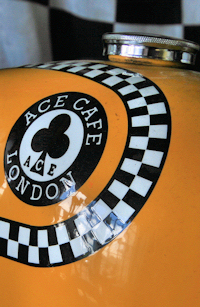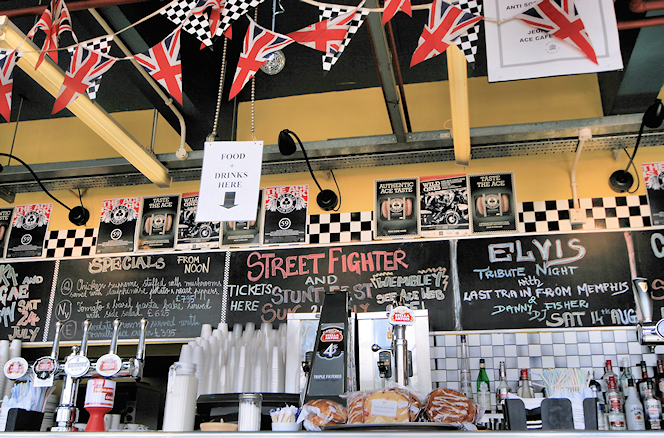Ace Café
Rockers’ café revived
Ace Café, North Circular Road, Stonebridge/Alperton border

The Ace Café is almost synonymous with the words ‘bygone era’. Like the North Circular Road beside which it stands, it opened between the wars – a forerunner of today’s motorway service stations, providing rest and refreshment to motorists enjoying their first experience of the freedom of the open highway. The Ace was wrecked by a bomb in 1940 and rebuilt after the war ended.
In the mid-1950s a new breed of road user began frighten the life out of sedate car drivers. Young motorcyclists burned up the dual carriageway and gathered here to listen to the first flowerings of rock ’n’ roll. The café reached the height of its fame in the early 1960s, and when British or American stars like Billy Fury or Gene Vincent were in London their managers put a photocall at the Ace high on their itinerary.
As the ‘rocker’ generation began to fade away so did the Ace. It closed in 1969 and the building served various other purposes until 2001, when its classic art-deco influenced exterior was restored and the interior was redecorated in homage to its glory days. Since then the Ace has steadily rebuilt its reputation as a palace of the motorcycle. Rallies of all kinds are held here and, when bikers organize a ride in the London area, or plan to descend on Westminster to protest against some proposed new tax or restriction, they rendezvous first at the Ace. Fans of scooters, classic cars and old-school rock ’n’ roll also meet at the Ace for special events and live shows.
On the average day, however, you’re more likely to find the café’s tables occupied by solitary truckers or little groups of sales reps. The food is better than average and there’s a licensed bar. A little souvenir shop offers all kinds of gifts and mementos branded with the café’s ace of clubs device and chequered flag border. At the time of writing they’re even selling packs of Ace-branded sausages to take home. There are free exhibitions too, of art and artefacts celebrating post-war youth culture and motorcycling heritage.


